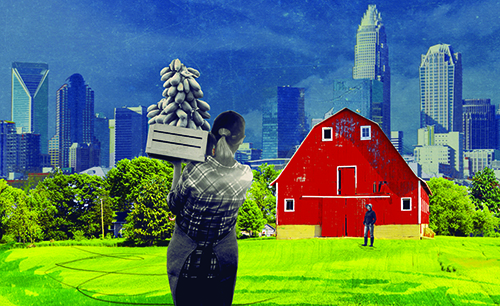Family
Feature
Farmer Daughter/Uptown Mother

The drive from my condo in uptown Charlotte, N.C., to my daughter’s rural community of Fairview takes less than three hours. Despite its geographic proximity, Sarah Julia’s farm feels like a foreign country. She intentionally lures bees and bugs to Yesod Farm+Kitchen to enrich the fertility of the land. I spray poison to ward those pests away from me and my home. I refer to the farm as her property. She says land is stewarded, not owned. I dream of her growing potatoes, tomatoes and onions. She, intent on repopulating native North Carolina flora, plants something called pawpaw trees that won’t yield fruit for years.
I do understand her nonprofit work. Sarah Julia, 27, and Shani Mink, 26, created the Jewish Farmer Network to combat the dual isolation of rural life and agricultural Judaism—ritual connected to the land rather than the synagogue. The organization they founded three years ago now has an online community of more than 900 Jewish farmers. Jewish Farmer Network convened its inaugural conference in Maryland in February, a sold-out weekend attracting considerable grant support.
Building an organization, assembling a project budget, selling event tickets—these processes are familiar to me after a career in business, management and nonprofit work, including creating the ticketing operation for a new NFL team 25 years ago. Valuing these skills, Sarah Julia had invited me to join the board of Jewish Farmer Network and then to volunteer at the conference. I compiled dietary preferences and managed payments to workshop leaders, tasks not requiring an understanding of permaculture or regenerative agriculture.
Lightening my daughter’s workload might have been weird, even unprofessional, if she were co-leading a convention of bankers or lawyers. But farming differs from an office job, where your mother calling you at work—or heaven forbid, visiting—might cause embarrassment. By contrast, Sarah Julia searched for me among the 160 conference attendees to invite me to join her table for Shabbat dinner, along with Shani and Shani’s mother, Leslie.
Leslie Mink and I were celebrated for showing up for our daughters. Thanked for volunteering our services. Praised for raising community organizers. Applauded at the closing session. A visiting funder—initially skeptical that Sarah Julia’s mom served on her board—graciously told me after our lunch conversation, “She’s lucky to have you.”
When our daughters choose a life that mirrors our own, supportiveness comes easily. After advocating for affordable housing and co-authoring Recharging Judaism, a book guiding congregations to step outside their buildings to create change in their communities, I can see that Sarah Julia’s civic leadership reflects my own values. This undoubtedly amplifies my pride in her accomplishments. The poignancy of a daughter, or daughter-in-law, following in her mother’s footsteps is illustrated in the Book of Ruth, read on Shavuot, which this year begins on May 28. After Ruth’s husband dies, she chooses to emulate her mother-in-law, Naomi, telling her, “Where you go, I’ll go. Where you live, I’ll live. Your people will be my people and your God, my God.”
Conversely, we may need to muster more imagination to understand those daughters who chart their own paths. In fact, generations of daughters have pursued strikingly different lives from those of their mothers.
My great-grandmother Riva Drutz stayed in Minsk when one of her daughters, Sophie, immigrated to Boston in the early 20th century. A generation later, Maury Seldin, the youngest of Sophie’s American-born sons, escorted Rachel Reisner on a date wearing his United States Coast Guard uniform. After they wed, Maury became a university professor and Rachel stayed home in the suburbs with their two daughters. Their younger daughter—me—became a working mom with a corporate job and a nanny, a path alien to Rachel. And now, my daughter embraces a life foreign to mine.
Yet that’s our job as mothers, encouraging our daughters to become the women they are meant to be. Whether or not their choices resemble ours.
Judy Seldin-Cohen is writing her second book, provisionally titled Choosing Chickens, Not Grad School. Her essay “Beyond Casseroles“ will be published in the upcoming anthology SHOUT! A Portrait of Activism. Find her at judyseldincohen.com.










 Facebook
Facebook Instagram
Instagram Twitter
Twitter
Diana Renfro says
Love this. So honest and revealing. Wonderful story.
Merle Gottheim says
This is wonderful Judy and teaches us about generational influence and how we learn from our mothers as well as our daughters.
Gene Ruth Poler says
Thank you for this article! I passed it along to our grandchild as well as a friend.
Diggie Pesakoff says
Thank you Judy, for sharing your compassion and honoring your daughter’s
chosen vocation. I will pass this onto my Granddaughter, Sophie, who will be graduating this December from Guilford College. Her major is Sustainable Food.
She has worked on the farm at school and taken leadership in many of it’s projects.
Hopefully she will get in touch with your daughter